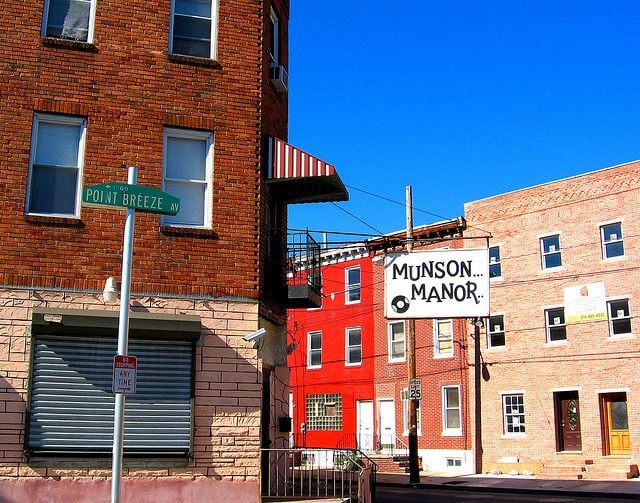Last week, Next American City chronicled attempts by the Philadelphia Redevelopment Authority (PRA) and 2nd District Councilman Kenyatta Johnson to acquire vacant lots in the rapidly developing Point Breeze neighborhood for use as affordable housing. Acquisition would be paid for with money left over from bonds issued for a past redevelopment initiative known as the Neighborhood Transformation Initiative (NTI).
Local developers saw the move, which would have seized dozens of privately owned lots through eminent domain, as a land grab designed to choke out private construction and hand free land to politically connected developers in the process. They accused the PRA and Johnson of having no plan or funding in place to justify the move. Johnson’s office said he was merely trying to combat skyrocketing home values. The acquisition seemed to fly in the face of the Nutter administration’s attempts to encourage the RDA to sell off some of the tens of thousands of vacant properties owned by various government agencies in Philadelphia. The PRA did not respond to questioning at that time.
Recently, I received a response from PRA spokesperson Paul Chrystie. He acknowledged that “the acquisitions [were] part of a city strategy to preserve affordability in a rapidly appreciating neighborhood while returning blighted, tax delinquent properties to productive, tax-generating use.” He said that 300,000 Philadelphia households were “cost-burdened,” or paying more than 30 percent of their income toward housing costs.
Chrystie dismissed developer Ori Feibush’s accusation that there was “no plan” in place for this development. “There is in fact a plan to move forward, and that is to issue an RFP. That can’t be done until all the parcels are in public ownership. Accordingly, once the acquisition process is complete, an RFP will be issued, likely in early 2013,” he said in an email, stressing that a quarter of the lots were already publicly owned, and that the condemnations would bring the rest under a single entity for easier development.
He said the urgency of the move was to prevent the government from expending excessive funds to acquire the parcels as they appreciated in value.
Responding to charges that the PRA was colluding with Johnson to stifle private development, Chrystie said that the city’s ultimate goal is to have a variety of different income levels in the neighborhood. He said the agency is not opposed to private construction.
“That is why the City has removed nearly 50 properties from the original condemnation list because they are actively moving toward private market development,” he said, referring to original acquisition plan that included 91 parcels. The most recent revision to the plan calls for the seizure of 43 properties.
Chrystie also did not see a conflict with the PRA acquiring lots while the agency nominally moves to rid itself of blighted properties. “The City and the Redevelopment Authority have multiple goals and are able to pursue them simultaneously,” he said. “Strategically acquiring parcels to increase affordable housing opportunities does not undermine the goal of returning properties owned by public entities to productive use.”
Indeed, Philadelphia has a massive problem with nonproductive properties. As of 2011, 103,000 out of nearly 670,000 properties in Philadelphia were tax delinquent, while 65,595 properties owed more than $1,000. Point Breeze alone had 4,062 tax delinquent properties in 2011. Fiscal advocates have also blamed excessive amount of city-owned land for exacerbating this issue, part of the reason the PRA was theoretically moving to sell off some of its holdings.
Although Chrystie emphasized that part of the PRA’s goal was to assist the city in returning delinquent properties to the tax rolls, recent analysis of Office of Property Assessment records shows that nearly half of the privately held lots in question owed $100 or less in unpaid taxes. Nine properties owed nothing at all, while three actually held negative tax balances.
Chrystie said he “didn’t mean it to imply that every property was [blighted or tax delinquent], but rather those were two of the issues affecting this set of properties.” He said the impact this project would have on the overall real estate market in Point Breeze would not be significant, noting that there were an estimated 18,000 properties in the 19146 zip code, which encompasses much of Point Breeze.
While Chrystie also confirmed that “NTI funds will support” the effort to acquire the lots in question, Johnson raised eyebrows this week after he introduced a bill in City Council this week that would seek a new funding source for project development — possibly, the City of Philadelphia itself. In a piece of legislation he introduced that would have the legislative body effectively sign off on the PRA’s efforts, almost guaranteeing that the land would ultimately be seized, Johnson included language in his bill seeking $1.7 million dollars through the city’s NTI fund to acquire the vacant lots, but did not list a source of funding for development.
This is a break from previously released PRA documents that the said the increased cost of affordable housing development would be covered by proceeds from a federal Neighborhood Stabilization Program that was recently completed in the same neighborhoods. The cost may now ultimately be born by the city.
Opponents have now created a petition to halt the seizure of lots, with some claiming that Johnson is attempting to use city funds to shift neighborhood demographics, and therefore electoral demographics, in his favor. Johnson won his seat in 2011 in a race against local real estate agent Barabara Capozzi, who lost by 59 votes. Capozzi was widely viewed as a “pro-development” candidate, due to her occupation, while Johnson’s agenda for his district has remained largely unclear. Johnson’s critics now charge that he is trying to pander to gentrification opponents and bring in more residents who would be unlikely to support another “pro-development” candidate.
Johnson’s office could not be reached for comment.
_200_200_80_c1.jpg)
Ryan Briggs is an investigative reporter based in Philadelphia. He has contributed to the Philadelphia Inquirer, WHYY, the Philadelphia City Paper, Philadelphia Magazine and Hidden City.
















